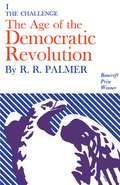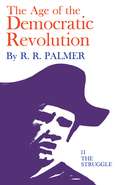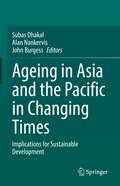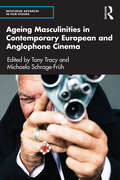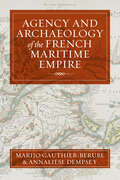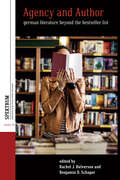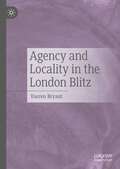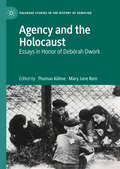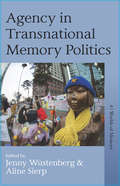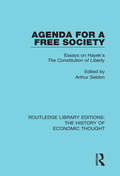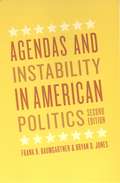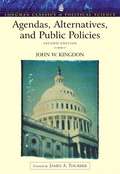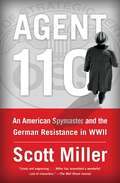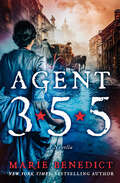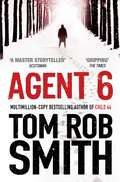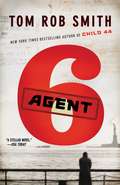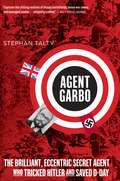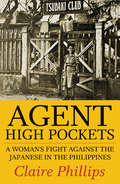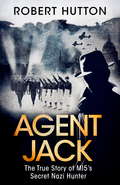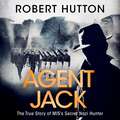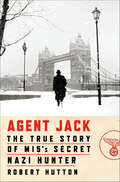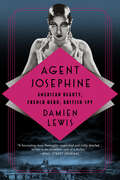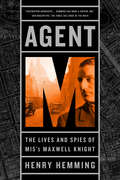- Table View
- List View
Age of the Democratic Revolution: The Challenge (Princeton Classics Ser. #90)
by R. R. PalmerFor the Western world as a whole, the period from about 1760 to 1800 was the great revolutionary era in which the outlines of the modern democratic state came into being. It is the thesis of this major work that the American, French, and Polish revolutions, and the movements for political change in Britain, Ireland, Holland, Belgium, Switzerland, Sweden, and other countries, though each distinctive in its own way, were all manifestations of recognizably similar political ideas, needs, and conflicts.
Age of the Democratic Revolution: The Struggle (Princeton Classics Ser. #90)
by R. R. PalmerFor the Western world as a whole, the period from about 1760 to 1800 was the great revolutionary era in which the outlines of the modern democratic state came into being. It is the thesis of this major work that the American, French, and Polish revolutions, and the movements for political change in Britain, Ireland, Holland, Belgium, Switzerland, Sweden, and other countries, although each distinctive in its way, were all manifestations of recognizably similar political ideas, needs, and conflicts.Volume 1 of this distinguished two-volume work, "The Challenge," received critical accolades throughout the world. It was the winner of the Bancroft Prize in 1960 and was called "one of the classic works of American historical scholarship" (Key Reporter) and a book which "will enlarge and clarify our understanding of modern Western history. It will re-emphasize the strength and vitality of the roots that supported the growth of democracy in the Old and New Worlds" (New York Times). "Occasionally a historical work appears which, by synthesis of much previous specialized work and by intelligent reflection upon the whole, makes events of the past click into a new pattern and assume fresh meaning. Professor Palmer's book is such a work" (American Historical Review)."The Challenge" took the story to the eve of the French Revolutionary wars; Volume 2, "The Struggle" continues the account to 1800.
Ageing Asia and the Pacific in Changing Times: Implications for Sustainable Development
by John Burgess Subas Dhakal Alan NankervisThis book demonstrates that there are wide-ranging potential challenges in addressing issues associated with ageing populations in both developed and developing countries of the region. This book brings together local, national and regional perspectives on the ageing population and sustainable development nexus in selected countries in the Asia Pacific region. The countries selected in this book include a mix of developed and developing economies that all reflect strong trade, investment and migration linkages. While the Asia Pacific region is forecast to enjoy high growth in the coming decade, a recurring common policy challenge is addressing the ‘demographic time bomb’ posed by ageing populations and workforces (Montague et al., 2017). Consequently, this book focuses on strategic policies and practices of multiple stakeholders, primarily: governments, industry and education systems, together with, the range of aged care services providers – in more effectively addressing these key socio-economic challenges associated with the ageing population for sustainable development.
Ageing Masculinities in Contemporary European and Anglophone Cinema (Routledge Advances in Film Studies)
by Tony Tracy Michaela Schrage-FrühThis volume offers a unique exploration of how ageing masculinities are constructed and represented in contemporary international cinema. With chapters spanning a range of national cinemas, the primarily European focus of the book is juxtaposed with analysis of the social and cultural constructions of manhood and the "anti-ageing" impulses of male stardom in contemporary Hollywood. These themes are inflected in different ways throughout the volume, from considering how old age is not the monolithic and unified life stage with which it is often framed, to exploring issues of queerness, sexuality, and asexuality, as well as themes such as national cinema and dementia. Offering a diverse and multifaceted portrait of ageing and masculinity in contemporary cinema, this book will be of interest to scholars and students of film and screen studies, gender and masculinity studies, and cultural gerontology.
Agency and Archaeology of the French Maritime Empire
by Marijo Gauthier-Bérubé and Annaliese DempseyThe French maritime empire enabled the continued colonization of territories all over the world from the 17th to the 19th centuries and was built upon the backs of those in lower socioeconomic classes. These classes were heavily impacted by social, political and economic structures. Detailed archaeological case studies using an agency perspective indicate that these lower socioeconomic classes were extremely diverse and dynamic groups that constantly negotiated their identities. These stories are not about the kings, military leaders, and politicians, but rather an exploration of the perspective of those who provided the fuel, both willingly and unwillingly, for the French maritime empire.
Agency and Author: German Literature Beyond the Bestseller List (Spektrum: Publications of the German Studies Association)
by Rachel J. Halverson Benjamin D. SchaperThe image of the solitary author devoting days and nights to writing endless bestselling novels remains an insidious and largely unchallenged myth within German culture. In this exacting examination of the German publishing industry, Agency and Author addresses the financial reality sometimes eclipsed by this idea. Focusing on lesser-known German-language writers and their interactions with the Literaturbetrieb (“literary scene”), Agency and Author explores the ways authors assert creative agency in an increasingly ‘eventized’ literary marketplace. Ranging from the impacts of literary awards to media hate campaigns, this volume spotlights how profoundly the German literary landscape and our understanding of authorship is transforming.
Agency and Locality in the London Blitz
by Darren BryantThis book takes a fresh approach to the London Blitz by viewing this time through individual local boroughs of the metropolis. The term ‘London Blitz’ means that culturally we have become accustomed to understanding that the actual blitz experience was the same wherever in the capital one happened to be, despite some areas being hit more than others. This book illustrates how there were many London blitzes, not one, influenced by a myriad of metropolitan localities, and giving rise to an agency of locality that helped to shape the lived blitz experience. By walking through the streets of London, this book conducts a local area analysis, witnessing the blitz through six London localities, representative of the assorted administrative, economic, and socio-political variables prevalent in wartime London. Covering air raids alongside topics like the provision of shelters, homelessness, and communal feeding, it shows how any history of the London Blitz must acknowledge that it was an experience reflective of a varied metropolis.
Agency and the Holocaust: Essays in Honor of Debórah Dwork (Palgrave Studies in the History of Genocide)
by Thomas Kühne Mary Jane ReinThe book assembles case studies on the human dimension of the Holocaust as illuminated in the academic work of preeminent Holocaust scholar Deborah Dwork, the founding director of the Strassler Center for Holocaust and Genocide Studies, home of the first doctoral program focusing solely on the Holocaust and other genocides. Written by fourteen of her former doctoral students, its chapters explore how agency, a key category in recent Holocaust studies and the work of Dwork, works in a variety of different ‘small’ settings – such as a specific locale or region, an organization, or a group of individuals.
Agency in Transnational Memory Politics (Worlds of Memory #4)
by Jenny Wüstenberg and Aline SierpThe dynamics of transnational memory play a central role in modern politics, from postsocialist efforts at transitional justice to the global legacies of colonialism. Yet, the relatively young subfield of transnational memory studies remains underdeveloped and fractured across numerous disciplines, even as nascent, boundary-crossing theories on topics such as multi-vocal, traveling, or entangled remembrance suggest new ways of negotiating difficult political questions. This volume brings together theoretical and practical considerations to provide transnational memory scholars with an interdisciplinary investigation into agency—the “who” and the “how” of cross-border commemoration that motivates activists and fascinates observers.
Agency in Transnational Memory Politics (Worlds of Memory #4)
by Jenny Wüstenberg and Aline SierpThe dynamics of transnational memory play a central role in modern politics, from postsocialist efforts at transitional justice to the global legacies of colonialism. Yet, the relatively young subfield of transnational memory studies remains underdeveloped and fractured across numerous disciplines, even as nascent, boundary-crossing theories on topics such as multi-vocal, traveling, or entangled remembrance suggest new ways of negotiating difficult political questions. This volume brings together theoretical and practical considerations to provide transnational memory scholars with an interdisciplinary investigation into agency—the “who” and the “how” of cross-border commemoration that motivates activists and fascinates observers.
Agenda for a Free Society: Essays on Hayek's The Constitution of Liberty (Routledge Library Editions: The History of Economic Thought #11)
by Arthur SeldonIn this book, first published in 1961, under the general editorship of Arthur Seldon of the Institute of Economic Affairs, ten eminent writers, economists, philosophers, and a legal authority have set down their views on the principles and policies of a free society in a rapidly changing world. Each has developed his theme from the same material – Professor F. A. Hayek’s monumental work The Constitution of Liberty. This title will be of interest to students of history and economics.
Agendas and Instability in American Politics (2nd edition)
by Frank R. Baumgartner Bryan D. JonesWhen Agendas and Instability in American Politics appeared fifteen years ago, offering a profoundly original account of how policy issues rise and fall on the national agenda, the Journal of Politics predicted that it would "become a landmark study of public policy making and American politics." That prediction proved true and, in this long-awaited second edition, Bryan Jones and Frank Baumgartner refine their influential argument and expand it to illuminate the workings of democracies beyond the United States.The authors retain all the substance of their contention that short-term, single-issue analyses cast public policy too narrowly as the result of cozy and dependable arrangements among politicians, interest groups, and the media. Jones and Baumgartner provide a different interpretation by taking the long view of several issues--including nuclear energy, urban affairs, smoking, and auto safety--to demonstrate that bursts of rapid, unpredictable policy change punctuate the patterns of stability more frequently associated with government. Featuring a new introduction and two additional chapters, this updated edition ensures that their findings will remain a touchstone of policy studies for many years to come.
Agendas, Alternatives, and Public Policies (2nd edition)
by John W. KingdonUnderstanding the complexity and dynamics of how the national agenda is set is essential to an explanation of the policy-making process in the United States. Locating the real policy agenda of the government requires an in-depth and prolonged analysis of broad arenas of political action, policy formulation, and policy definition. Prior to John W. Kingdon's Agendas, Alternatives, and Public Policies, first published in 1984, political scientists did not pay much attention to agenda setting. Kingdon's Agendas established an important theoretical foundation for all post-1984 scholarship on the policy-making process. He defines the policy agenda as "the list of subjects to which government officials and those around them are paying serious attention."
Agent 110: An American Spymaster and the German Resistance in WWII
by Scott Jeffrey MillerThe &“lively and engrossing&” (The Wall Street Journal) story of how OSS spymaster Allen Dulles built an underground network determined to take down Hitler and destroy the Third Reich.Agent 110 is Allen Dulles, a newly minted spy from an eminent family. From his townhouse in Bern, Switzerland, and in clandestine meetings in restaurants, back roads, and lovers&’ bedrooms, Dulles met with and facilitated the plots of Germans during World War II who were trying to destroy the country&’s leadership. Their underground network exposed Dulles to the political maneuverings of the Soviets, who were already competing for domination of Germany, and all of Europe, in the post-war period. Scott Miller&’s &“absorbing and bracing&” (The Seattle Times) Agent 110 explains how leaders of the German Underground wanted assurances from Germany&’s enemies that they would treat the country humanely after the war. If President Roosevelt backed the resistance, they would overthrow Hitler and shorten the war. But Miller shows how Dulles&’s negotiations fell short. Eventually he was placed in charge of the CIA in the 1950s, where he helped set the stage for US foreign policy. With his belief that the ends justified the means, Dulles had no qualms about consorting with Nazi leadership or working with resistance groups within other countries to topple governments. Agent 110 is &“a doozy of a dossier on Allen Dulles and his early days spying during World War II&” (Kirkus Reviews). &“Miller skillfully weaves a double narrative of Dulles&’ machinations and those of the German resistance&” (Booklist) to bring to life this exhilarating, and pivotal, period of world history—of desperate renegades in a dark and dangerous world where spies, idealists, and traitors match wits and blows to ensure their vision of a perfect future.
Agent 355: A Novella
by Marie BenedictA fictional portrayal of a real-life Revolutionary spy and her daring deeds, from the New York Times–bestselling author of The Only Woman in the Room.Agent 355 is a result of author Marie Benedict&’s quest to bring history&’s most fascinating and courageous women to life for contemporary readers. Known to history only by her alias, this mysterious female spy, able to move freely and unobtrusively in Loyalist circles, became a member of George Washington&’s New York–based Culper Ring. This thrilling novella depicts who Marie Benedict thinks Agent 355 could have been, though her true identity remains unknown. During the sweltering summer of 1779, eighteen-year-old Elizabeth Morris attends the social events of the British-occupied city, but the forced merriment holds no charm for her. She finds herself in the company of enemy soldiers, who think nothing of discussing matters of government and war in front of mere women. This invisibility becomes Elizabeth&’s greatest asset as she offers her services to Robert Townsend, a Continental sympathizer. Her bravery will bring down one of the most notorious traitors in American history and ultimately seal her fate as a woman willing to sacrifice everything for love and country.
Agent 407: A South African Spy Tells Her Story
by Olivia ForsythIn the world of espionage, truth is the first victim and nothing is as it seems. Here, for the first time, South Africa's most notorious apartheid spy Olivia Forsyth lays bare the story of her remarkable life. Olivia Forsyth was a romantic young woman in search of adventure when she joined the Security Police with visions of international derring-do. But Craig Williamson, her unit head, had other ideas and Olivia was trained to spy on students before being dispatched to Rhodes University, a supposed 'hotbed' of anti-apartheid radicalism. It wasn't long before Olivia had infiltrated various student organisations, feeding vital information back to her handler. She came to hold prominent positions on campus and, as reward, was promoted to Lieutenant. Having reached the end of her studies, Olivia set her sights on a much more ambitious - and dangerous - target: the ANC in exile. But what should have been her greatest triumph as a spy turned into disaster when the ANC threw her into Quatro, the notorious internment camp in Angola. This is a riveting story set in the final years of apartheid.
Agent 6
by Tom Rob SmithTHREE DECADES.TWO MURDERS.ONE CONSPIRACY.WHO IS AGENT 6?Tom Rob Smith's debut, Child 44, was an immediate publishing sensation and marked the arrival of a major new talent in contemporary fiction. Named one of top 100 thrillers of all time by NPR, it hit bestseller lists around the world, won the CWA Ian Fleming Steel Dagger Award and the ITW Thriller Award for Best First Novel, and was longlisted for the Man Booker Prize. In this spellbinding new novel, Tom Rob Smith probes the tenuous border between love and obsession as Leo Demidov struggles to untangle the threads of a devastating conspiracy that shatters everything he holds dear. Deftly capturing the claustrophobic intensity of the Cold War-era Soviet Union, it's at once a heart-pounding thriller and a richly atmospheric novel of extraordinary depth....AGENT 6Leo Demidov is no longer a member of Moscow's secret police. But when his wife, Raisa, and daughters Zoya and Elena are invited on a "Peace Tour" to New York City, he is immediately suspicious.Forbidden to travel with his family and trapped on the other side of the world, Leo watches helplessly as events in New York unfold and those closest to his heart are pulled into a web of political conspiracy and betrayal-one that will end in tragedy.In the horrible aftermath, Leo demands only one thing: to investigate the killer who destroyed his family. His request is summarily denied. Crippled by grief and haunted by the need to find out exactly what happened on that night in New York, Leo takes matters into his own hands. It is a quest that will span decades, and take Leo around the world--from Moscow, to the mountains of Soviet-controlled Afghanistan, to the backstreets of New York--in pursuit of the one man who knows the truth: Agent 6.
Agent 6: Child 44, The Secret Speech, And Agent 6 Omnibus (The Child 44 Trilogy #3)
by Tom Rob SmithTHREE DECADES.TWO MURDERS.ONE CONSPIRACY.WHO IS AGENT 6?Tom Rob Smith's debut, Child 44, was an immediate publishing sensation and marked the arrival of a major new talent in contemporary fiction. Named one of top 100 thrillers of all time by NPR, it hit bestseller lists around the world, won the CWA Ian Fleming Steel Dagger Award and the ITW Thriller Award for Best First Novel, and was longlisted for the Man Booker Prize. In this spellbinding new novel, Tom Rob Smith probes the tenuous border between love and obsession as Leo Demidov struggles to untangle the threads of a devastating conspiracy that shatters everything he holds dear. Deftly capturing the claustrophobic intensity of the Cold War-era Soviet Union, it's at once a heart-pounding thriller and a richly atmospheric novel of extraordinary depth....AGENT 6Leo Demidov is no longer a member of Moscow's secret police. But when his wife, Raisa, and daughters Zoya and Elena are invited on a "Peace Tour" to New York City, he is immediately suspicious.Forbidden to travel with his family and trapped on the other side of the world, Leo watches helplessly as events in New York unfold and those closest to his heart are pulled into a web of political conspiracy and betrayal-one that will end in tragedy.In the horrible aftermath, Leo demands only one thing: to investigate the killer who destroyed his family. His request is summarily denied. Crippled by grief and haunted by the need to find out exactly what happened on that night in New York, Leo takes matters into his own hands. It is a quest that will span decades, and take Leo around the world--from Moscow, to the mountains of Soviet-controlled Afghanistan, to the backstreets of New York--in pursuit of the one man who knows the truth: Agent 6.
Agent Garbo: The Brilliant, Eccentric Secret Agent Who Tricked Hitler and Saved D-Day
by Stephan Talty&“The book presses ever forward down a path of historical marvels and astonishing facts. The effect is like a master class that&’s accessible to anyone, and Agent Garbo often reads as though it were written in a single, perfect draft.&”—The AtlanticBefore he remade himself as the master spy known as Garbo, Juan Pujol was nothing more than a Barcelona poultry farmer. But as Garbo, he turned in a masterpiece of deception that changed the course of World War II. Posing as the Nazis&’ only reliable spy inside England, he created an imaginary million-man army, invented armadas out of thin air, and brought a vast network of fictional subagents to life. The scheme culminated on June 6, 1944, when Garbo convinced the Germans that the Allied forces approaching Normandy were just a feint—the real invasion would come at Calais. Because of his brilliant trickery, the Allies were able to land with much less opposition and eventually push on to Berlin.As incredible as it sounds, everything in Agent Garbo is true, based on years of archival research and interviews with Pujol&’s family. This pulse-pounding thriller set in the shadow world of espionage and deception reveals the shocking reality of spycraft that occurs just below the surface of history.&“Stephan Talty&’s unsurpassed research brings forth one of the war&’s greatest agents in a must-read book for those who think they know all the great World War II stories.&” —Gregory Freeman, author of The Forgotten 500
Agent High Pockets
by Claire Philips Myron B. GoldsmithAgent High Pockets, first published in 1947 as Manila Espionage, is the fast-paced account of American Claire Phillips' experiences in Manila during the Japanese occupation in World War Two (the book is also the basis for the 1951 movie I Was an American Spy,). Prior to the war, Phillips had worked in Manila as part of a musical group. She had married, separated, and returned to the US, but came back to Manila just before the Japanese invasion. She fell in love with John Phillips, a soldier, and married him just after the war broke out; her husband became a prisoner of war, but sadly, was captured and died during his imprisonment. At the urging of American guerrilla leader John Boone, she began working for the resistance movement, opening a club for Japanese officers in order to win favors from the Japanese and to be able to send financial help and messages to the prisoners of war. The club also let her obtain intelligence from the Japanese clients, which she smuggled to the guerrillas who then forwarded the information to General Douglas MacArthur’s headquarters. As a guerrilla agent, her code name was “High Pockets” as she typically kept messages in her bra. Eventually though, she was arrested and tortured by the Japanese and spent more than eight months in prison before her liberation by U.S. Forces in 1945. After the war, she and her daughter returned to the United States. In recognition for her courageous efforts in the Philippines, Claire Phillips was awarded the Medal of Freedom in 1951.
Agent Jack: The True Story of MI5's Secret Nazi Hunter
by Robert Hutton'Highly readable' Ben Macintyre'Pacy, original and frequently chilling' Henry HemmingJune 1940. Britain is Europe's final bastion of freedom - and Hitler's next target. But not everyone fears a Nazi invasion. In factories, offices and suburban homes are men and women determined to do all they can to hasten it.Throughout the Second World War, Britain's defence against the enemy within was Eric Roberts, a former bank clerk from Epsom. Equipped with an extraordinary ability to make people trust him, he was recruited into the shadowy world of espionage by the great spymaster Maxwell Knight. Roberts penetrated first the Communist Party and then the British Union of Fascists, before playing his greatest role for MI5 - as Hitler's man in London. Codenamed Jack King, he single-handedly built a network of hundreds of British Nazi sympathisers, with many passing secrets to him in the mistaken belief that he was a Gestapo officer. Operation Fifth Column, run by a brilliant woman scientist and a Jewish aristocrat with a sideline in bomb disposal, was kept so secret it was omitted from the reports MI5 sent to Winston Churchill. In a narrative that grips like a thriller, Robert Hutton tells the fascinating story of an operation whose existence has only recently come to light. Drawing on newly declassified documents and private family archives, Agent Jack shatters the comfortable notion that Britain could never have succumbed to fascism, and celebrates - at last - the courage of individuals who protected the country they loved at great personal risk.
Agent Jack: The True Story of MI5's Secret Nazi Hunter
by Robert HuttonJune 1940. Britain is Europe's final bastion of freedom - and Hitler's next target. But not everyone fears a Nazi invasion. In factories, offices and suburban homes are men and women determined to do all they can to hasten it.Throughout the Second World War, Britain's defence against the enemy within was Eric Roberts, a former bank clerk from Epsom. Equipped with an extraordinary ability to make people trust him, he was recruited into the shadowy world of espionage by the great spymaster Maxwell Knight. Roberts penetrated first the Communist Party and then the British Union of Fascists, before playing his greatest role for MI5 - as Hitler's man in London. Codenamed Jack King, he single-handedly built a network of hundreds of British Nazi sympathisers, with many passing secrets to him in the mistaken belief that he was a Gestapo officer. Operation Fifth Column, run by a brilliant woman scientist and a Jewish aristocrat with a sideline in bomb disposal, was kept so secret it was omitted from the reports MI5 sent to Winston Churchill. In a narrative that grips like a thriller, Robert Hutton tells the fascinating story of an operation whose existence has only recently come to light. Drawing on newly declassified documents and private family archives, Agent Jack shatters the comfortable notion that Britain could never have succumbed to fascism, and celebrates - at last - the courage of individuals who protected the country they loved at great personal risk.Read by Roger Davis(P) Orion Publishing Group 2018
Agent Jack: The True Story of MI5's Secret Nazi Hunter
by Robert Hutton"An appealing mix of accessibility and research. [Hutton] has illuminated a fascinating and often appalling side of the war at home." — Wall Street Journal The never-before-told story of Eric Roberts, who infiltrated a network of Nazi sympathizers in Great Britain in order to protect the country from the grips of fascismJune 1940: Europe has fallen to Adolf Hitler’s army, and Britain is his next target. Winston Churchill exhorts the country to resist the Nazis, and the nation seems to rally behind him. But in secret, some British citizens are plotting to hasten an invasion. Agent Jack tells the incredible true story of Eric Roberts, a seemingly inconsequential bank clerk who, in the guise of “Jack King”, helped uncover and neutralize the invisible threat of fascism on British shores. Gifted with an extraordinary ability to make people trust him, Eric Roberts penetrated the Communist Party and the British Union of Fascists before playing his greatest role for MI5: Hitler's man in London. Pretending to be an agent of the Gestapo, Roberts single-handedly built a network of hundreds of British Nazi sympathizers—factory workers, office clerks, shopkeepers —who shared their secrets with him. It was work so secret and so sensitive that it was kept out of the reports MI5 sent to Winston Churchill. In a gripping real-world thriller, Robert Hutton tells the fascinating story of an operation whose existence has only recently come to light with the opening of MI5’s World War II files. Drawing on these newly declassified documents and private family archives, Agent Jack shatters the comforting notion that Britain could never have succumbed to fascism and, consequently, that the world could never have fallen to Hitler. Agent Jack is the story of one man who loved his country so much that he risked everything to stand against a rising tide of hate.
Agent Josephine: American Beauty, French Hero, British Spy
by Damien LewisThe New Yorker, Best Books of 2022 Vanity Fair, Best Books of 2022 Booklist, Best Books of 2022 Singer. Actress. Beauty. Spy. During WWII, Josephine Baker, the world's richest and most glamorous entertainer, was an Allied spy in Occupied France. Prior to World War II, Josephine Baker was a music-hall diva renowned for her singing and dancing, her beauty and sexuality; she was the highest-paid female performer in Europe. When the Nazis seized her adopted city, Paris, she was banned from the stage, along with all &“negroes and Jews.&” Yet instead of returning to America, she vowed to stay and to fight the Nazi evil. Overnight, she went from performer to Resistance spy. In Agent Josephine, bestselling author Damien Lewis uncovers this little-known history of the famous singer&’s life. During the war years, as a member of the French Nurse paratroopers—a cover for her spying work—Baker participated in numerous clandestine activities and emerged as a formidable spy. In turn, she was a hero of the three countries in whose name she served—the US, France, and Britain. Drawing on a plethora of new historical material and rigorous research, including previously undisclosed letters and journals, Lewis upends the conventional story of Josephine Baker, explaining why she fully deserves her unique place in the French Panthéon.
Agent M: The Lives and Spies of MI5's Maxwell Knight
by Henry HemmingSpying is the art of knowing who to trust-and who to betrayMaxwell Knight was perhaps the greatest spymaster in history, rumored to be the real-life inspiration for the James Bond character "M." He did more than anyone in his era to combat the rising threat of fascism in Britain during World War II, in spite of his own history inside this movement. He was also truly eccentric--a thrice-married jazz aficionado who kept a menagerie of exotic pets--and almost totally unqualified for espionage.Yet he had a gift for turning practically anyone into a fearless secret agent. Knight's work revolutionized British intelligence, pioneering the use of female agents, among other accomplishments. In telling Knight's remarkable story, Agent M also reveals for the first time in print the names and stories of some of the men and women recruited by Knight, on behalf of MI5, who were asked to infiltrate the country's most dangerous political organizations.Drawing on a vast array of original sources, Agent M reveals not only the story of one of the world's greatest intelligence operators, but the sacrifices and courage required to confront fascism during a nation's darkest time.
